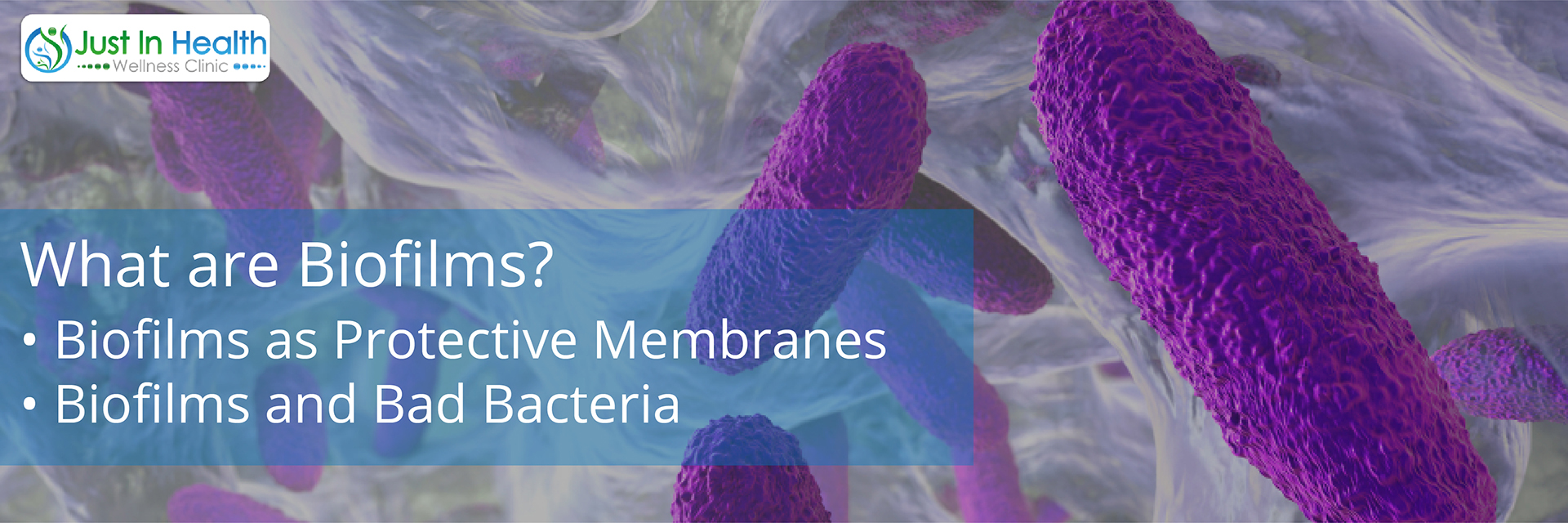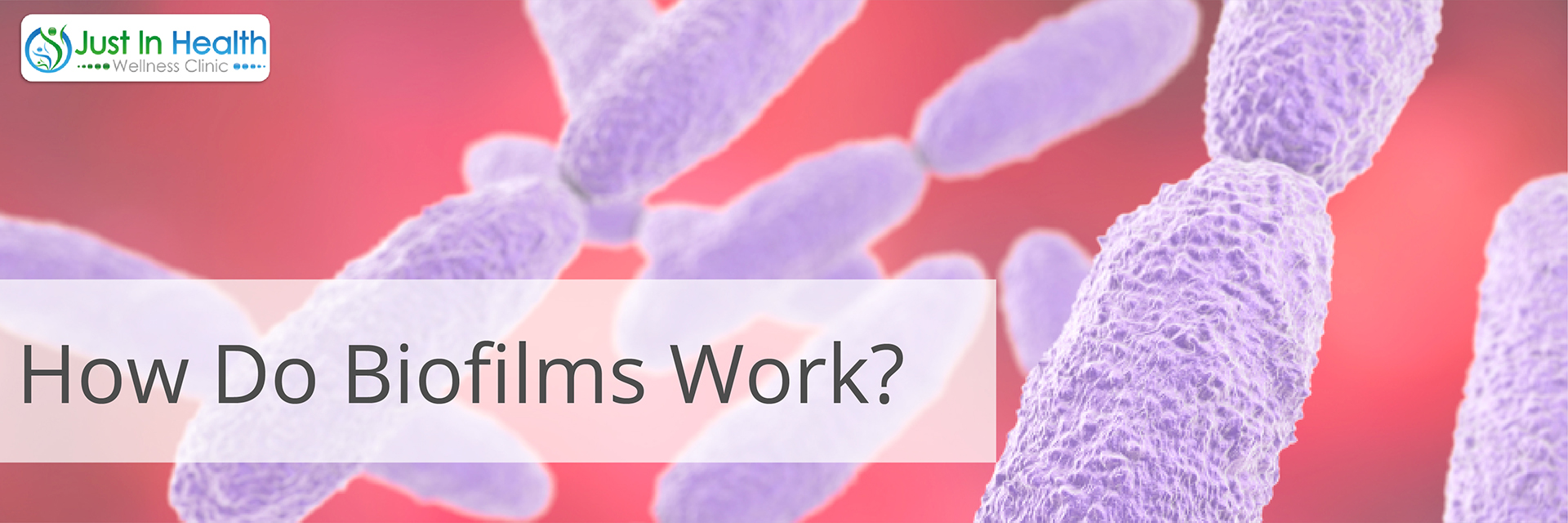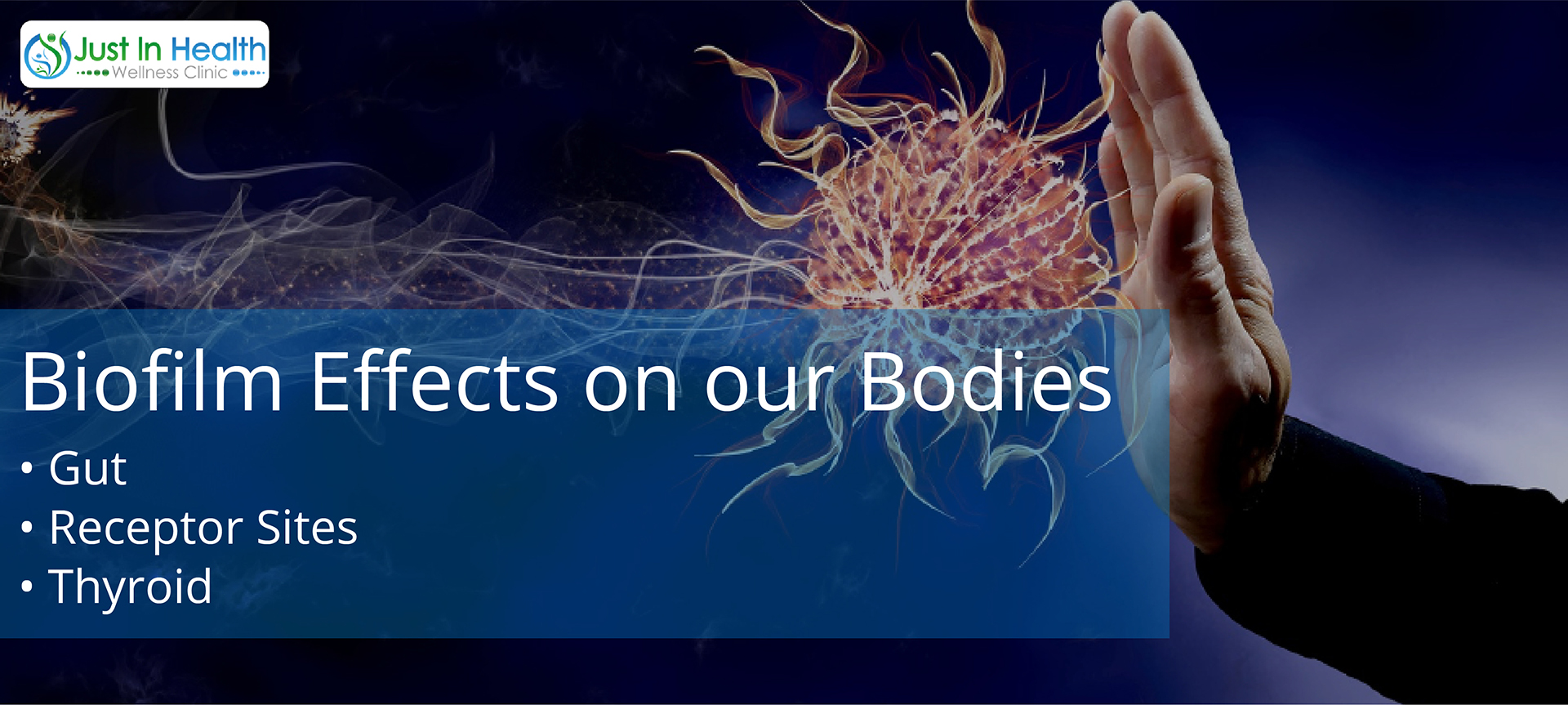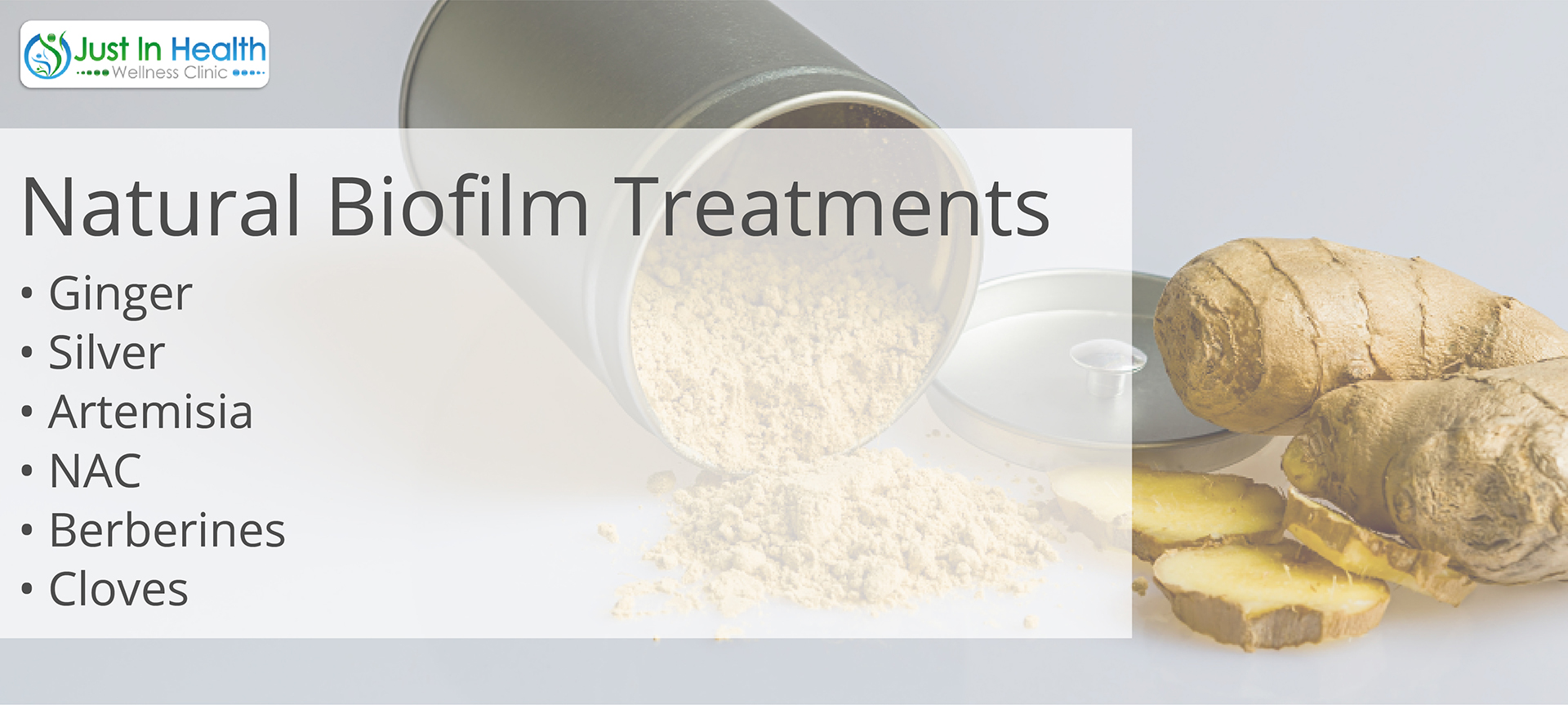
 By Dr. Justin Marchegiani
By Dr. Justin Marchegiani
Today's video is going to be on biofilms and your health, especially your thyroid. We are going into what biofilms are, how they make it very difficult for us to get rid of bad bacteria that is creating problems in your gut; and also how it affects your thyroid and what solutions we can do to help fix it for good.

Biofilms are made out of these things called EPS—Extracellular Polymeric Substance. What the heck does that mean? They are nucleic acids, some complex sugars and some proteins all stuck together. It makes a protective force field, so to speak, over the bacteria.
So we have these bacteria called planktonic bacteria. Essentially, we're not talking about planktonic bacteria. Planktonic bacteria, they’re kind of bacteria that antibiotics kill. Biofilms rest on top of planktonic bacteria. It's like that protective force field, if you will. So when we look at biofilms, they are like the force field. If you watch that movie, 300, where they have all these Roman—Greek soldiers, so to speak. Well, what happens in that movie is they have their spear and then they have their shield; and the goal is they use their shield to protect them and they come in there and jab with the spear.
So think of the shield as like what the biofilm does for the bacteria. It protects it from invaders and here's the thing. Things like antibiotics have a very difficult time even knocking down biofilms. That's part of the reason why we have this antibiotic resistance. Yes, the medicines aren’t working; but also the biofilms are a big reason why these antibiotics aren’t working and we have natural strategies to help fix it.
Just think about it, too, with your teeth. Ever get that kind of slimy coating over your teeth when you wake up in the morning, it kind of feel slick like you got sweaters on your teeth? That's a biofilm. Now we have these all in our certain bacteria in the gut, especially the bad ones—the gram-negative and gram-positive, dysbiotic or bad ones. So we want to take that coating off. It’s like you got grease on your table and you don't clean the grease up with soap. You use water and it still feels like that slick coating there. Well, that’s like a biofilm in all your cells and it makes it very difficult when we have a higher amount of bad bacteria in relationship to good bacteria. It’s hard for us to kill it.
Now the bad bacteria puts out toxins and produces things called lipopolysaccharides. If we have fungus, it will produce mycotoxins and endotoxins, things that actually are toxic to our body. They can create leaky gut. They can cross the blood-brain barrier and they can even create mood disruptions, anxiety, depression, and who would have thought all that can come from your gut and it also can disrupt digestion. If we have poor digestion, we can't break down proteins, fats, ionized minerals and all the things that we eat we can’t reconstitute them into our body and into our energy system. So really important, if we have bad bacterial issues, we want to be able to kill the bacteria. And one of the biggest obstacles preventing us, are going to be the biofilm. So that's what the biofilms are.

Now how it works is biofilms attach and they're like this little protective kind of slimy coating. This is kind of phase one here. They attach and then over time, they start to grow. They start to accumulate here; and then here is where biofilms are really difficult is they start to disperse. Then they will start to travel and attach and adhere to other parts of the body. So they will disperse itself down the road.
Now, they were having issues even with biofilms affecting medical transplants such as hips and knees and prosthetic devices. They're even using things like silver—silver coatings like in colloidal silver to help prevent and break down biofilm. Some of the research, we’ll go over here in a bit shows that silver can help break down biofilm 70-97%. See the references below for that study.
So we really want to be able to affect biofilms because they can affect our guts, but they can also affect even conventional allopathic surgeries. There are a lot of research studies coming out over the last 15 years. It’s becoming a big issue that biofilms are a big problem and they're trying to address it with these different things such as silver and even Mānuka honey for wound issues because these films are protecting the antibiotics from actually working. They are preventing the antibiotics from working.

We know gut bacteria has a major effect on our immune system and most thyroid issues are autoimmune. So if we have our immune system attacking the thyroid gland, the gut bacteria, whether it's out of balance or in balance, it can have a huge effect on our immune system. When we’re out of balance, the more beneficial bacteria we have that that’s low in relationship to the high amount of bad stuff, we'll throw our immune system out of whack and we can start attacking our thyroid tissue.
Bad bacteria can also create more leaky gut; it can allow undigested food particles to slip through the gastrointestinal tight junctions in our intestinal tract; it can get into the bloodstream where our immune system is not used to seeing and start creating a feeding frenzy, so to speak. And we can get a case of mistaken identity because our immune systems are seeing proteins and particles that are in the bloodstream that typically aren't there. So it can create leaky gut, it can create more toxicity, it can then put stress on our immune system as well and skew out our TH1 and TH2 balance. And it can create an issue where we're making higher amounts of TH2 in our body and our immune system is starting to hyper respond to self tissue, autoimmune, self killing self.
It can also affect receptor sites. When we have inflammation in the body, whether it’s inflammation from endogenous toxins or inflammation from our body attacking self, that can block the receptor site.
So imagine you're coming home from work you put your key in the house, but the hole’s filled in. Someone put some Silly Putty in there. Well, now the key doesn’t work, right? Think of the key as like the thyroid hormone. Think of the keyhole as like the receptor site. So if we have something in there, whether it's inflammatory proteins, interleukins, antibodies—that's gonna prevent that key or that hormone from locking into the receptor site and creating that metabolic effect that we want.
It can also decrease T4 to T3 conversion. Because one of the big things in our gut, as we have T3 acetic acid and T3 sulfate, and we need this compound called sulfatase which is an enzyme produced by beneficial bacteria. And if we have low amounts of bad bacteria, that's going to affect our sulfatase levels. Lower sulfatase means lower T4 to T3 conversion. If T4 to T3 converts like this, and we need sulfatase here. And we have T3 acetic acid and T3 sulfate over here, and we need this and this is produced by beneficial bacteria—BB—and if we have more dysbiotic bacteria, so our beneficial bacteria is low, that’s going to decrease sulfatase from happening. That's going to decrease our T4 to T3 conversion from happening, and T3 is really our active thyroid hormone.
So you can see, if we start to have bacterial issues, that is going to affect our thyroid. Most doctors, most thyroid specialists, they aren't looking at the gut being a root cause of their thyroid issue. Now on that note, we also know fungus such as candida and parasite infections also use biofilms to help protect themselves. Yersinia is one of them—Yersinia enterocolitica, candida and other parasite infections will still use biofilms to protect themselves. Now that’s important because we know things like Blasto and H. pylori and candida can also affect our thyroid gland, affect our immune system, and also increase inflammation and affect our thyroid gland from working optimally.
So again, it's good to look at the thyroid. It's good to look at thyroid support, but if we’re ignoring the gut then we’re ignoring a big piece of the puzzle. And if we ignore the biofilm piece, that's a huge element that we need to overcome to be able to get the bad bacteria back into place.

One of the things I do in my clinic is we use ginger with all of my gut patients. Anyone that has a gut infection. Zingiber officinale is the medical herb name for it, but ginger for short. Everyone knows it by ginger. It’s a natural biofilm disruptor. It’s commonly used in the GAPS protocol as well. We actually put some honey in as well, like a wild clover or a raw type of honey. You can even use Mānuka honey which is shown to be antibacterial and antibiofilm as well, and we’ll juice 3 or 4 cloves of ginger.
I have a video on this where I put it in my Vitamix or your Magic Bullet, blend it up really nice. Add some hot water to it. Throw in a French press. Let it sit for 3 or 4 minutes. Filter it out. Squeeze a quarter of a lime and a little bit of honey in there. And—boom—you got a great drink that you can sip all day that will help keep things moving. It’s a natural prokinetic meaning it keep your guts and your intestines moving. It's anti-inflammatory and anticoagulant so it keep cells from sticking to each other. It keep things flowing and it's a biofilm disruptor. There are lots of great studies on this. I'm going to post it below in the reference section. Take a look at it if you need.
They’re using this in hip surgeries today, knee surgeries, all kinds of different medical procedures up to 97% reduction in biofilms are taking the sheets of silver almost like a cellophane sheet. And they’re putting it over the area that was operated, very helpful at preventing the biofilm formation and allowing whatever type of antimicrobial is being used, typically an antibiotic, to be able to work better.
I'll put a study down below where they use Artemisia and Cipro. The Artemisia actually helped the Cipro work better. So even if you’re conventionally minded here, these herbs are going to help the antibiotics work better. Now one of the problems with the antibiotics is the efflux pumps. They essentially don’t get inhibited, so the antibiotics gets pushed out of the cell back into the bloodstream. It's because we are not addressing the efflux pump issue.
So again, like I mentioned before, these herbs are going to help the efflux pumps. Efflux pumps are basically, let’s say you’re in a boat. The boat’s taking on water and you put the bilge pump on or you get your bucket and you start scooping the water from the boat, back into the water. That's like an efflux pump. Just imagine the antibiotics is being the water. Now the problem is, if we want to sink the ship or sink that bacterial component, we don't want the bilge pump or we don’t want the person to pick up the bucket and start putting the water or the antibiotic in this analogy back out into the ocean. We want that boat to take on water so it sinks. Also, we want that bacteria to take on the antimicrobial and sink. So the herbs tend to also have an effect at inhibiting efflux pumps. Think of efflux pumps as your bilge pump or that someone taking the pale and baling up the water.
This is actually a really cool amino acid compound. It’s a sulfur-based amino acid used in phase 2 detoxification, which is how your body takes toxins and mobilizes it out of the body. Also, it helps with glutathione levels and it also helps take down these biofilms. It’s like soap on a kind of liquid-y oily surface and it helps clean that right off. So NAC is a really great biofilm buster.
Berberines are phenomenal. These are a family of herbs. To name a few, we have golden seal, we have barberry, we have berberine HCL, Hydrastis, Coptis, organ grape to name a few and these are very antibacterial. These are also efflux pump inhibitors. They work really good with Artemisia together. It’s excellent. And they help break down a lot of these biofilms, too. So when we create protocols to knock down these infections, we combine these herbs together. I have a high amount of berberines in one of my products called by GI Clear One and GI Clear Two.
Cloves are shown to be to be antibiofilm as well. It has that nice little cinnamon smell to it, that Christmas-y smell. Very good, very antibiofilm. We put this in our GI Clear Two product and the cloves help with the biofilms there.
Fix leaky gut and thyroid issues by contacting a functional medicine expert HERE!
Anytime we deal with the gut issue, we typically always assume biofilms are present because it’s going to allow us, the patient that haven’t got results in the past, it’s going to allow us to work better with any gut issue that’s there. It’ll help kill whatever needs to be eradicated. And then we also have enzymes and these are enzymes taken on an empty stomach a lot of times, whether it's serratiopeptidase or enteric-coated proteolytic enzymes to go in there and help break down the biofilms. And we’ll even use some enzymes that have EDTA in it, because sometimes these biofilms will take on minerals as a protective shield as well. They’ll make up minerals as part of that biofilm plaque and so sometimes enzymes with some chelators in there can be helpful to break down any of those biofilms.
So in review, what are biofilms? They’re this polymeric substance made out of protein and some sugar. We're trying to allow the antimicrobials or antibiotics to work better. Biofilms are the protective shield that allow those things to not penetrate and not work well. Biofilms and your thyroid, we talked about how it decreases receptor sites. It affects thyroid conversion and it can increase leaky gut and autoimmunity. It can increase leaky gut and autoimmunity, also prevents the pituitary from working well, too.
And I’ll add one more thing here, just autoimmune. Autoimmune thyroid and that’s Hashimoto’s for short, and we'll put leaky gut because that’s one of the main mechanisms that a lot of these thyroid issues come from. We talked about all the natural biofilm agents, ginger to silver to Artemisia to NAC to honey Mānuka, the berberines, the clove, and the various enzymes. Now if you have a health issue right now and your gut’s not getting better, your thyroid’s not getting better, biofilms could be a component that needs to be addressed.
So the next step is get some comprehensive stool analysis done, look at your gut, look at your adrenals, look at your hormonal system and your thyroid together, and then come up with a comprehensive plan. If you need help doing that, click on-screen or reach out below so you could access to some of my great information and also working with me one-on-one as well.